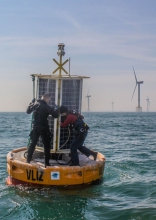
VLIZ reports annually on the current state of marine research in Flanders and Belgium in the form of a policy informing brief and thus maintains a close watch on this dynamic research field. The most recent report, among other things, maps out the research capacity as well as the scientific output for the year 2020 and elaborates on international collaborations, the geographical focus of the research and the use of research vessels.
The most recent inventory (Pirlet et al. 2021) shows that Belgium counts 123 marine research groups (MRGs) that together published more than 750 marine peer-reviewed publications in 2020 - in both cases a significant increase compared to 2019. We can therefore say that the corona year 2020 was still a very fruitful year for our marine researchers. Internationally, the scientific output of the MRGs is comparable to the larger marine institutes in neighbouring countries.
In addition to a high productivity, the latest inventory shows again the rich variety of the Belgian marine research. The research groups are active in no less than 24 different disciplines, with natural sciences (86 MRGs) and engineering (41 MRGs) at the top. Most of the Belgian MRGs are affiliated with Flemish university associations (75) and French-speaking universities and university colleges (34), although the individual groups of the Flemish and federal scientific institutions generally have a larger number of scientific and technical staff.
Over the past 12 years - since the first counting of these indicators in 2008 - all marine research groups together have published in almost 1400 different journals. Meanwhile, more than 67% of these publications appear in open access journals, whereas in 2008 this was only 29%.
Belgian marine research is also strongly internationally oriented. In almost 80% of the publications, the study area is beyond our national borders and in 74% there is international cooperation (so-called international co-publications). Most of these international collaborations take place with neighbouring countries and the US, but the network of our marine researchers extends to no fewer than 157 countries. Also, in about 26% of the cases (2008-2020) a (research) vessel was used for the data collection, accounting for a total of 293 different (research) vessels from no less than 43 countries.
With this annual policy informing brief, VLIZ attempts to inform marine and maritime (science) policy makers, the marine research community and other stakeholders about the character and evolution of marine research in Belgium. You can find an explanation of the applied replication methodology in the note.
This annual policy informing brief is part of the Compendium for Coast and Sea (www.compendiumkustenzee.be/en). We would also like to refer you to the Indicator Report Marine Research and Innovation of the Compendium for Coast and Sea 2018, where a more extensive mapping of the marine research and innovation landscape was carried out.
Furthermore, you can always contact compendium@vliz.be with questions about this publication.
Link: http://www.vliz.be/en/imis?module=ref&refid=347434